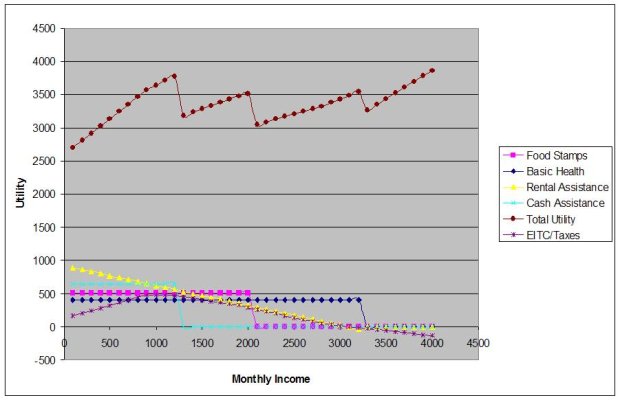This was an interesting project for me since I had to learn a fair amount about all of the major programs here in the state. Some programs like the housing vouchers have waiting lists, although once you're in the program, the benefits are quite generous- if you qualify, you must pay 30% of your income towards rent or a mortgage, and the program will pay the remaining amount up until a pre-defined amount which varies by region. In addition to this, there is a utility allowance added to cover electricity, heating, cooking, etc. When determining the # of bedrooms a place can have, they figure 2 people per room, so a family of four would have a 2br place. The family could rent/own a 3br place, although they would only receive the 2br benefit level.
Cash assistance through TANF is limited to a lifetime benefit of 60 months, and you must have "need"- meaning that your essential expenditures outstrip your income....what are essential? Here's the list- "food, clothing, shelter, energy costs, transportation, household maintenance and operations, personal maintenance, and necessary incidentals."
When it comes to assets, almost all of the programs ask about savings, checking, CDs, and almost any other account you can think of. One glaring omission (to me at least) were assets like gold and silver- fairly liquid, and of high value... so in theory, you could sit on a ton of gold, and it wouldn't count against you. If your car is worth $4500 or more, any amount over that number is also treated as an asset- unless you owe money on it. This means that you could have a $30k car, owe $26k on it, and it wouldn't count against you.
Food stamps- aka 'Basic Food' here in WA- seemed to provide fairly generous benefits through an EBT card.
I don't have anything against social services- I like social services. My problem with the current system is that there is obviously a disincentive to earn money until you pass a certain income pont. As the family size grows (ie: 6 people), the disincentive becomes even larger (I'll put up another graph tonight if I remember). IMO, this is not what should be happening... there should always be an incentive to earn more money, not less.

